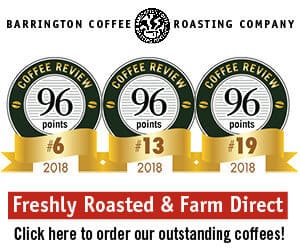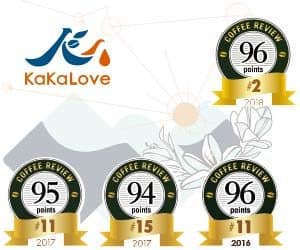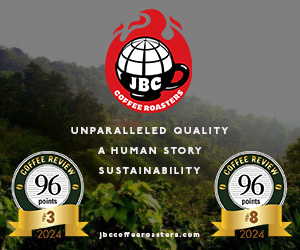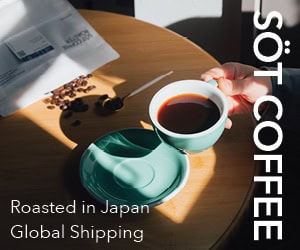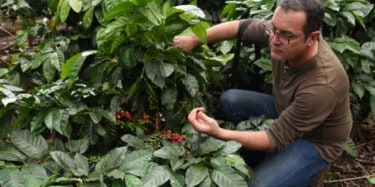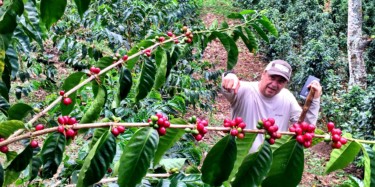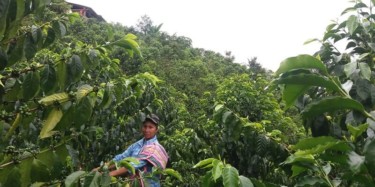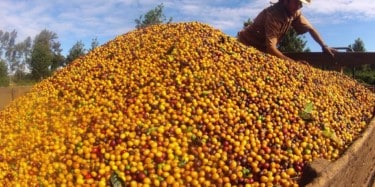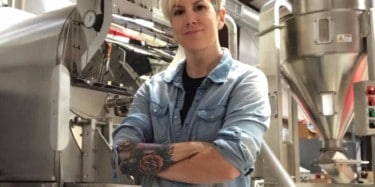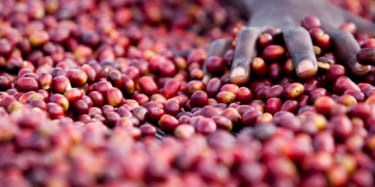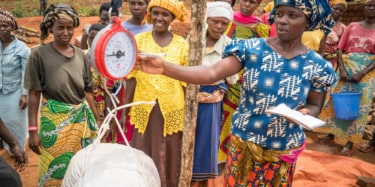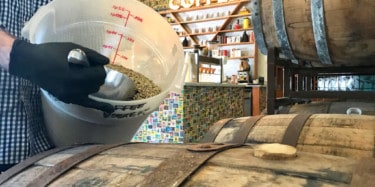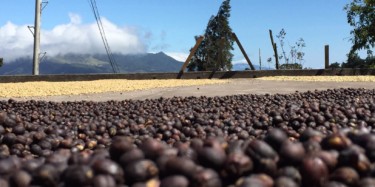This exceptional coffee was selected as the No. 10 coffee on Coffee Review’s list of the Top 30 Coffees of 2019. This coffee also earned the highest rating in a cupping of coffees produced using reduced oxygen (“anaerobic”) processing methods for Coffee Review’s November 2019 tasting report. The intensity and complexity of this extraordinary coffee are owing both to tree variety and processing
SEARCH RESULTS
Cordillera del Fuego Costa Rica Anaerobic
This exceptional coffee was selected as the No. 19 coffee on Coffee Review’s list of the Top 30 Coffees of 2019. This coffee tied for second-highest rating in a cupping of coffees produced using reduced oxygen (“anaerobic”) processing methods for Coffee Review’s November 2019 tasting report. Anaerobic processing in this case means that producer Luis Eduardo Campos fermented this coffee, after
Peru Paltachayoc
This coffee tied for the fourth-highest rating in a cupping of coffees submitted by North American roasters in business for two or fewer years for Coffee Review’s October 2019 tasting report. Certified organic. Produced by Braulio Barazorda Borda and Valentin Champi Paullo of the Huadquiña Cooperative entirely of the Typica variety of Arabica and processed by the traditional wet or washed method
Idealism and Achievement: 8 New North American Roasting Companies
Opening a new coffee roastery today seems like a daunting idea. There's the increasingly troubled U.S. economy, but even more alarming is the unprecedented turmoil in the global coffee industry, which includes insultingly low prices paid to farmers, infrastructure challenges, and climate change, which has virtually wiped out some regional coffee industries, put many more under extreme stress, and
Geisha Coffees Continue to Shatter Sales Records — Are They Worth The Hype?
When we last wrote in depth about Geisha (also spelled Gesha) coffees in 2017, a 100-pound lot of this prized variety of Arabica, grown at Hacienda La Esmeralda by the Peterson family, had just broken the then-current record for the highest price ever paid for a green coffee: $601 per pound. Flash forward to July of this year, when that record was shattered by the Lamastus family, whose Elida
Ethiopia Hambela 1 Organic Natural Alaka
Certified organic. Oromia is a coffee region in southern Ethiopia that produces distinctive coffees from traditional varieties of Arabica long grown in the region. This is a “natural” or dry-processed version, meaning the beans were dried inside the fruit rather than after the fruit has been removed, as is the case with wet-processed or “washed” coffees. Hambela Estate has produced fine coffee
Brazil Ibicoara Chapada Diamantina Natural
Produced by Luca Allegro, Nelson Ribeiro, Fazendas Floresta and Aranquan, and Asociación Biodinámica d'Ibicoara, entirely from trees of the Catuai variety of Arabica and processed by the natural, or dried-in-the-fruit, method. Certified organic. SkyTop Coffee is a USDA certified-organic specialty coffee roaster based in Manlius, New York. For more information, visit skytopcoffee.com.
Costa Rica Coto Brus-La Amistad
Produced by Roberto Montero from trees of the Caturra and Catuai varieties of Arabica and processed by the wet, or washed, method. Certified organic. SkyTop Coffee is a USDA certified-organic specialty coffee roaster based in Manlius, New York. For more information, visit skytopcoffee.com.
Revisiting the Andes: Coffees From Peru, Ecuador and Bolivia
The three coffee-growing countries that range along the Andes south of Colombia — Ecuador, Peru and Bolivia — have rich and storied coffee histories. When Coffee Review last dove in to this region, with reports in 2010 and 2013, we found many impressively solid, softly balanced coffees in the Latin-American tradition — all produced from classic tree varieties like Typica and Caturra and processed
Natural-Process Espressos: Fruit and Chocolate Exalted
I recently led a tasting of fine coffees at a consumer event. Only one of these coffees was natural-processed, i.e., had been prepared at the mill by drying the coffee seeds or beans inside the whole fruit. The other samples were all washed coffees, processed by drying the beans after the fruit skin and flesh had been removed. The washed method is the traditional norm for fine coffee in most
Coffees from Brazil: Chocolate, Simplicity and Some Surprises
For more than 150 years, Brazil has produced more coffee than any other country in the world. Coffee prices worldwide fall and rise on the slightest whisper of good news or bad news about Brazil’s next coffee crop. Brazil also is among the world’s most technologically advanced coffee producers. Nevertheless, for buyers of high-end single-origin coffees, Brazil shrinks to something smaller than,
Women in Coffee: Why It Matters That “She’s the Roaster”
Last summer, we began our exploration of women's roles in the complex coffee supply chain by looking at the work of farmers—women who work in coffee production as pickers, managers, members of cooperatives, and owners of small farms. In this month's report, we turn our attention to those women who are crucial in the next step of the supply chain: turning green coffee into roasted. We structured
2017 Holiday Gift Coffees
Each year, we ask roasters to send us exceptional coffees available only during the holidays, coffees that might make particularly gratifying gifts or splurges for coffee-lovers. In past years, approaches have ranged from particularly fine lots of classic coffees that roasters reserved for the holiday season, to rare and often expensive seasonally available micro-lot coffees, to ingenious and
Gesha Coffees 2017: Still Pricey, Still Amazing
I was at one of the Specialty Coffee Association’s Re:co Symposia a couple of years ago, where Jay Ruskey of Goodlands Organic, the pioneer of California coffee-growing, was displaying fresh branches of two varieties of coffee trees at his table outside the meeting rooms. Some of the branches were from the respected mainstream Caturra coffee variety, which is producing some very nice coffees on
Ninety Plus Gesha Estates Limited Batch #227
This exceptional coffee was selected as the No. 5 coffee on Coffee Review’s list of the Top 30 Coffees of 2017. This coffee is a collaboration between brothers Michael Johnson of JBC and Joseph Brodsky of Ninety Plus Coffee. It was produced entirely from trees of the celebrated Gesha variety of Arabica, and processed by a proprietary variation of the wet method in which the coffee fruit is
Holding Up (More Than) Half The Sky: Coffees From Women Producers
Mao Zedong’s famous statement that “women hold up half the sky” became central to the zeitgeist of the Western feminist movement of the 1960s and ‘70s, when identity politics began to foreground the plight of women—economically, socially and politically—both in the U.S. and abroad. Regardless of one’s position on the merits of focusing on gender-based affiliations versus shared values as tools for
Aged, Casked and Cured: Innovations in Green Coffee Conditioning
Green, unroasted coffee beans are porous and absorbent. As anyone in the industry knows from painful experience, green beans easily pick up odors from almost anything in their environment — paints stenciled on coffee bags, for example, concrete floors, petroleum residue in shipping containers, cardamom stored in the same warehouse. But where there is a problem there also may be an opportunity.
Ethiopia Charbanta Natural
This exceptional coffee was selected as the No. 10 coffee on Coffee Review’s list of the Top 30 Coffees of 2016. Produced by the Charbanta Cooperative, a new organization previously associated with the Idido Cooperative. This is a dry-processed or “natural” coffee, meaning the beans were dried inside the fruit rather than after the fruit has been removed, as is the case with wet-processed or
Guatemala Waykan
The word ‘Waykan’ means ‘shining star in the night sky’ in the Mayan Q’qnjobal dialect. This coffee comes from small-holding, mainly indigenous coffee farmers in the Quiché Department of Guatemala. Processed by the wet or washed method (fruit skin and pulp are removed before drying). This coffee tied for the top rating in a tasting of single-origin espressos from the Americas for Coffee Review‘s
Beyond the Review: Celebrating Coffees in Depth
This is not your typical Coffee Review tasting report. In fact, it is something of an unplanned improvisation. We originally had scheduled a tasting report on coffees of Costa Rica this month, but we decided to postpone it until next month, October. It turned out that Costa Ricas were slow to arrive in roasters’ warehouses this crop year, and we feared that if we rushed the article we would miss




